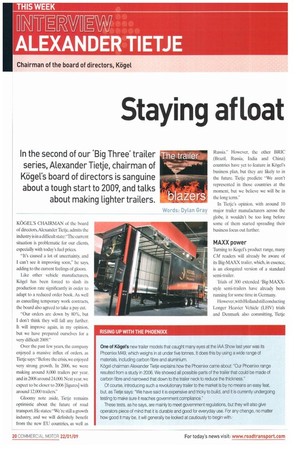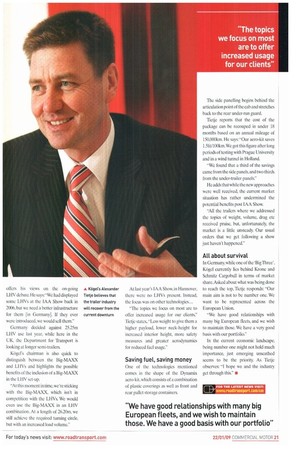Staying afloat
Page 20

Page 21

If you've noticed an error in this article please click here to report it so we can fix it.
In the second of our 'Big Three' trailer series, Alexander Tietje, chairman of Kogel's board of directors is sanguine about a tough start to 2009, and talks about making lighter trailers.
KOGEL'S CHAIRMAN of the board of directors, Alexander Tietje, admits the industry is in a difficult state:"The current situation is problematic for our clients, especially with today's fuel prices.
"It's caused a lot of uncertainty, and I can't see it improving soon," he says, adding to the current feelings of gloom.
Like other vehicle manufacturers, Kogel has been forced to slash its production rate significantly in order to adapt to a reduced order book. As well as cancelling temporary work contracts, the board also agreed to take a pay cut.
"Our orders are down by 80%, but I don't think they will fall any further. It will improve again, in my opinion, but we have prepared ourselves for a very difficult 2009."
Over the past few years, the company enjoyed a massive influx of orders, as Tietje says:-Before the crisis, we enjoyed very strong growth. In 2006, we were making around 8,000 trailers per year, and in 2008 around 24.000. Next year, we expect to be closer to 2006 [figures] with around 12,000 trailers."
Gloomy note aside, Tietje remains optimistic about the future of road transport. He states: "We're still a growth industry, and we will definitely benefit from the new EU countries, as well as Russia." However, the other BRIC (Brazil, Russia, India and China) countries have yet to feature in Kogel's business plan, but they are likely to in the future. Tietje predicts: "We aren't represented in those countries at the moment, but we believe we will be in the long term."
In Tietje's opinion, with around 10 Words: Dylan Gray major trailer manufacturers across the globe, it wouldn't be too long before some of them started spreading their business focus out further.
MAXX power
liming to Kogel's product range, many CM readers will already be aware of its Big-MAXX trailer, which, in essence, is an elongated version of a standard semi-trailer.
Trials of 300 extended 'Big-MAXXstyle semi-trailers have already been running for some time in Germany.
However,with Holland still conducting Longer Heavier Vehicle (LHV) trials and Denmark also committing, Tietje offers his views on the on-going LHV debate. He says:"We had displayed some LHVs at the IAA Show back in 2006, but we need a better infrastructure for them cm Germany]. If they ever were introduced, we would sell them."
Germany decided against 25.25m LHV use last year, while here in the UK, the Department for Transport is looking at longer semi-trailers.
Kogel's chairman is also quick to distinguish between the Big-MAXX and LHVs and highlights the possible benefits of the inclusion of a Big-MAXX in the LHV set-up.
"At this moment in time,we're sticking with the Big-MAX_X, which isn't in competition with the LHVs. We would even use the Big-MAXX in an LHV combination. At a length of 26.20m, we still achieve the required turning circle, but with an increased load volume." At last year's IAA Show in Hannover, there were no LHVs present. Instead, the focus was on other technologies...
"The topics we focus on most are to offer increased usage for our clients," Tietje states,."Less weight to give them a higher payload, lower neck-height for increased interior height, more safety measures and greater aerodynamics for reduced fuel usage."
Saving fuel, saving money
One of the technologies mentioned comes in the shape of the Dynamix aero-kit, which consists of a combination of plastic coverings as well as front and rear pallet storage containers. The side panelling begins behind the articulation point of the cab and stretches back to the rear under-run guard.
Ttetje reports that the cost of the package can he recouped in under 18 months based on an annual mileage of 150,000km. He says: "Our aero-kit saves 1.51itilOOkm_We got this figure after long periods of testing with Prague University and in a wind tunnel in Holland.
"We found that a third of the savings came from the side panels, and two thirds from the under-trailer panels."
He adds that while the new approaches were well received, the current market situation has rather undermined the potential benefits post IAA Show.
"All the trailers where we addressed the topics of weight, volume, drag etc received praise, but, unfortunately, the market is a little unsteady Our usual orders that we get following a show just haven't happened."
All about survival
In Germany, while one of the 'Big Three', Kogel currently lies behind Krone and Schmitz Cargobuil in terms of market share. Asked about what was being done to reach the top. Tic:* responds: "Our main aim is not to be number one. We want to be represented across the European Union, "We have good relationships with many big European fleets, and we wish to maintain those. We have a very good basis with our portfolio."
In the current economic landscape, being number one might not hold much importance, just emerging unscathed seems to be the priority. As Tletje observes: "I hope we and the industry get through this." • rfl FOR THE LATEST HEWS vim,: wiNareadiraitsport.coottan
















































































































































